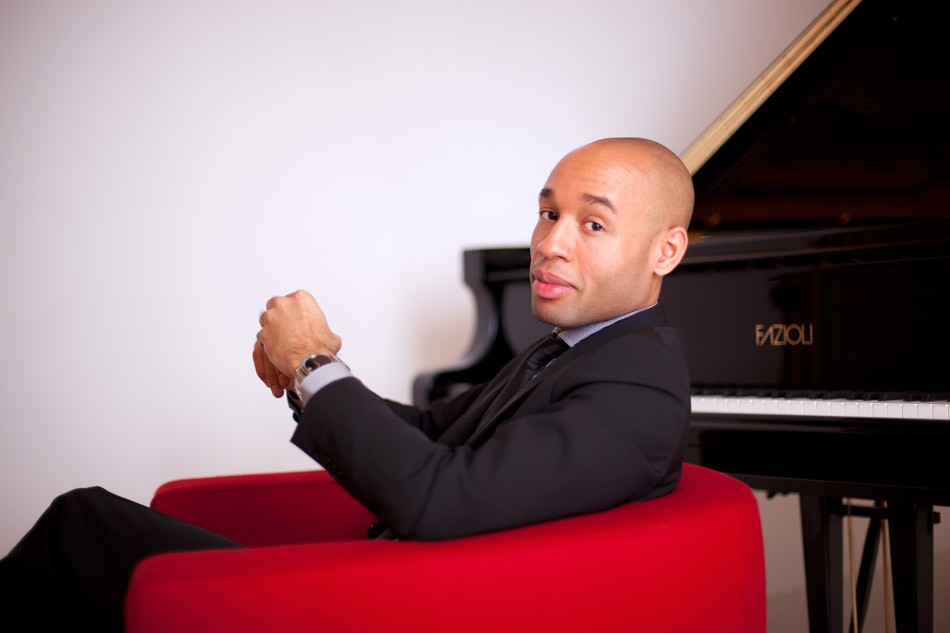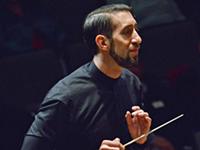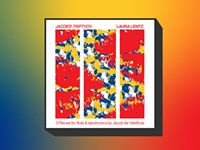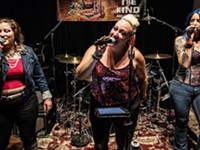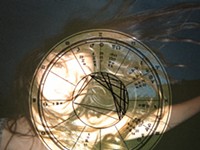[
{
"name": "500x250 Ad",
"insertPoint": "5",
"component": "15667920",
"parentWrapperClass": "",
"requiredCountToDisplay": "1"
}
]
Over the last two decades, jazz fans have heard pianist Aaron Diehl play inventive jazz solos with Wynton Marsalis and Cécile McLorin Salvant. A different sort of audience has heard him play George Gershwin's Piano Concerto in F with the New York Philharmonic and the music of Philip Glass at Brooklyn Academy of Music.
Diehl grew up loving jazz and classical music, and he’s still dedicated to both. That dichotomy forms the basis of “Paradoxes in Performance,” the title of his concert Saturday night at Nazareth College’s new and acoustically excellent Glazer Performance Hall. The program ranges from compositions by Aaron Copland, Antonín Dvořák and Philip Glass to tunes by Jelly Roll Morton, James P. Johnson and Duke Ellington.
Diehl’s parents purchased a baby grand piano for the family’s Columbus, Ohio home when he was four. His grandfather was a jazz musician who would play the piano whenever he visited. “I was always mesmerized by the sound of music,” Diehl says. “I got a chance to be exposed to jazz music from a young age. I also remember being in love with the works of Bach and eventually, Beethoven. I just loved classical music.”
As a young teenager, Diehl spent two summers at Interlochen Arts Camp in Michigan where he met the young Kyrgyzstani protégé, Eldar Djangirov, who was playing works by Oscar Peterson and Art Tatum. “I would see this 10-year-old kid play transcriptions of virtuoso pianists and I thought, wow, I want to be able to do that too,” Diehl says about Djangirov. “It wasn’t the first time I’d heard it, but I became more interested in it. Eldar definitely made a firm impression on me. I went there to study classical piano, but I got more involved in the jazz world and I wanted to play with those musicians.”
At 17, Diehl was a finalist in Jazz at Lincoln Center’s “Essentially Ellington” competition. That led to an invitation to tour Europe with the Wynton Marsalis Septet. “I actually turned him down initially because I had an opportunity to go to a camp in Aspen,” Diehl says. The wife of saxophonist Wesley Anderson told Diehl, “Are you crazy? When Wynton Marsalis asks you to go on the road with him you say yes and turn down everything else.”
“I didn’t know what I was doing,” Diehl says of playing with Marsalis then. “I think Wynton did it to show me what it was going to take to play at the level that he and his band were playing at. I was really struggling. I have recordings I can’t even listen to. It was a reality check. When you’re 17, I don’t care how good you are, nothing can replace experience — especially when you’re playing with guys who have played together for 20 years.”
Next stop was The Juilliard School, where Diehl studied with jazz greats Kenny Barron and Eric Reed and classical pianist Oxana Yablonskaya. “She was amazing,” Diehl says. “She didn’t pressure me. We found a few pieces — Rachmaninoff, some of the Russian literature. It was always about the joy of playing.”
Diehl’s keyboard prowess was rewarded in 2011 when he won the American Pianists Association’s Cole Porter Fellowship. The prize was $50,000 and a recording contract with Mack Avenue Records. The following year, he began a fruitful relationship as pianist and musical director for jazz vocalist Cécile McLorin Salvant, whom he greatly admires. “You can probably give her the worst material imaginable and she can make it sound good,” Diehl says.
Though he has performed at the pinnacle of the jazz world, Diehl has never lost his fascination with classical music. For him, it’s about approaches. “As a classical musician you’re serving the intentions of the composer; that’s sacrosanct,” he says. “As a jazz musician, you’re using a work by someone and reinterpreting that work. One of the methods is improvising. But in the 18th century, someone like Johann Sebastian Bach improvised. The language of improvisation was completely different, but the idea to me about great music is the blur between improvised music and the written score."
Diehl has encountered resistance when improvising sections of “Rhapsody in Blue,” a composition at the intersection of jazz and classical music. People have told him “that’s not Gershwin.” Though he is using the structure provided by Gershwin, Diehl’s improvisations are not meant to be Gershwin.
“Some of the challenge of classical music and jazz is how traditionally the conventions of each genre have stuck and how it can be difficult to break those conventions,” Diehl says. “There’s this push and pull between being respectful to the composer but having the freedom to expand beyond that, and it’s a real tricky balance. I don’t always get it right but it’s a quest to refine that balance.”
There may be a parallel in another of Diehl’s interests: flying. He’s a licensed pilot who flies regularly. There too, he must maintain a balance. “There’s a nice combination of relaxation but also concentration and focus,” he says. “You can relax when you’re at altitude, but you have to be incredibly focused during the critical phases of flight — take-off and landing.”
Aaron Diehl plays Saturday, April 6, 8 p.m. at Beston Hall in Nazareth College’s Glazer Music Performance Center, 4245 East Avenue. $38. 389-2170. naz.edu/artscenter; aarondiehl.com.
Diehl grew up loving jazz and classical music, and he’s still dedicated to both. That dichotomy forms the basis of “Paradoxes in Performance,” the title of his concert Saturday night at Nazareth College’s new and acoustically excellent Glazer Performance Hall. The program ranges from compositions by Aaron Copland, Antonín Dvořák and Philip Glass to tunes by Jelly Roll Morton, James P. Johnson and Duke Ellington.
Diehl’s parents purchased a baby grand piano for the family’s Columbus, Ohio home when he was four. His grandfather was a jazz musician who would play the piano whenever he visited. “I was always mesmerized by the sound of music,” Diehl says. “I got a chance to be exposed to jazz music from a young age. I also remember being in love with the works of Bach and eventually, Beethoven. I just loved classical music.”
As a young teenager, Diehl spent two summers at Interlochen Arts Camp in Michigan where he met the young Kyrgyzstani protégé, Eldar Djangirov, who was playing works by Oscar Peterson and Art Tatum. “I would see this 10-year-old kid play transcriptions of virtuoso pianists and I thought, wow, I want to be able to do that too,” Diehl says about Djangirov. “It wasn’t the first time I’d heard it, but I became more interested in it. Eldar definitely made a firm impression on me. I went there to study classical piano, but I got more involved in the jazz world and I wanted to play with those musicians.”
At 17, Diehl was a finalist in Jazz at Lincoln Center’s “Essentially Ellington” competition. That led to an invitation to tour Europe with the Wynton Marsalis Septet. “I actually turned him down initially because I had an opportunity to go to a camp in Aspen,” Diehl says. The wife of saxophonist Wesley Anderson told Diehl, “Are you crazy? When Wynton Marsalis asks you to go on the road with him you say yes and turn down everything else.”
“I didn’t know what I was doing,” Diehl says of playing with Marsalis then. “I think Wynton did it to show me what it was going to take to play at the level that he and his band were playing at. I was really struggling. I have recordings I can’t even listen to. It was a reality check. When you’re 17, I don’t care how good you are, nothing can replace experience — especially when you’re playing with guys who have played together for 20 years.”
Next stop was The Juilliard School, where Diehl studied with jazz greats Kenny Barron and Eric Reed and classical pianist Oxana Yablonskaya. “She was amazing,” Diehl says. “She didn’t pressure me. We found a few pieces — Rachmaninoff, some of the Russian literature. It was always about the joy of playing.”
Diehl’s keyboard prowess was rewarded in 2011 when he won the American Pianists Association’s Cole Porter Fellowship. The prize was $50,000 and a recording contract with Mack Avenue Records. The following year, he began a fruitful relationship as pianist and musical director for jazz vocalist Cécile McLorin Salvant, whom he greatly admires. “You can probably give her the worst material imaginable and she can make it sound good,” Diehl says.
Though he has performed at the pinnacle of the jazz world, Diehl has never lost his fascination with classical music. For him, it’s about approaches. “As a classical musician you’re serving the intentions of the composer; that’s sacrosanct,” he says. “As a jazz musician, you’re using a work by someone and reinterpreting that work. One of the methods is improvising. But in the 18th century, someone like Johann Sebastian Bach improvised. The language of improvisation was completely different, but the idea to me about great music is the blur between improvised music and the written score."
Diehl has encountered resistance when improvising sections of “Rhapsody in Blue,” a composition at the intersection of jazz and classical music. People have told him “that’s not Gershwin.” Though he is using the structure provided by Gershwin, Diehl’s improvisations are not meant to be Gershwin.
“Some of the challenge of classical music and jazz is how traditionally the conventions of each genre have stuck and how it can be difficult to break those conventions,” Diehl says. “There’s this push and pull between being respectful to the composer but having the freedom to expand beyond that, and it’s a real tricky balance. I don’t always get it right but it’s a quest to refine that balance.”
There may be a parallel in another of Diehl’s interests: flying. He’s a licensed pilot who flies regularly. There too, he must maintain a balance. “There’s a nice combination of relaxation but also concentration and focus,” he says. “You can relax when you’re at altitude, but you have to be incredibly focused during the critical phases of flight — take-off and landing.”
Aaron Diehl plays Saturday, April 6, 8 p.m. at Beston Hall in Nazareth College’s Glazer Music Performance Center, 4245 East Avenue. $38. 389-2170. naz.edu/artscenter; aarondiehl.com.
